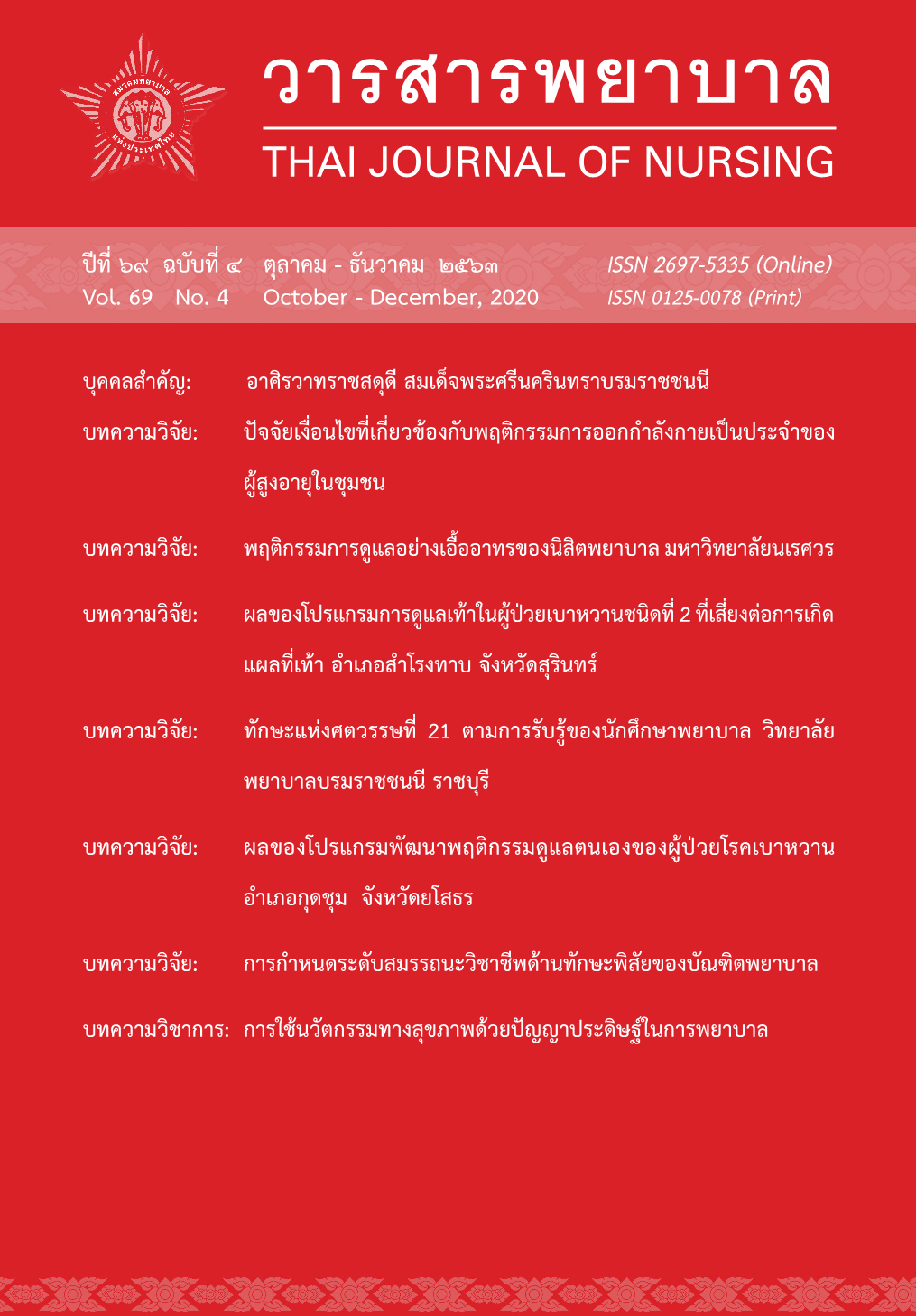Effects of a self-care behavior development program for Diabetes Mellitus patients at Kut Chum district, Yasothon province
Main Article Content
Abstract
The objectives of this quasi-experimental research were to compare self-care behavior, blood sugar and blood pressure of an experimental group before and after experiment, and after experiment between the experimental group and the comparison group. The sample comprised Diabetes Mellitus patients who could not control blood sugar, attended at the chronic disease clinic in Non Mi and Phon Ngam subdistrict health promoting hospital, Kut Chum District, Yasothon Province. They were selected by the purposive sampling technique as inclusion criteria to be experimental group and comparison group respectively, 35 persons in each group, with similar in sex, age, and time of illness. The experimental tool was the Self-care Behavior Development Program based on Orem’s self-care theory. The collecting data tools were: 1) questionnaires with 2 parts: (1) general data, (2) self-care behavior (CVI 0.96 and reliability 0.92), 2) glucometer and digital sphygmomanometer, and 3) a health data record form. Data were analyzed by descriptive statistics, t-test, Wilcoxon Matched Pairs Signed rank test, and Mann-Whitney U test. The results found as follows. (1) After experiment, overall self-care behaviors of the experimental group was significantly higher than that before experiment (p < .05). These behaviors were significantly higher than that of the comparison group (p <.05). Every aspects of self-care behaviors of the experimental group were significantly higher than before experiment and higher than the comparison group, however, medical self-care behavior of the experimental group did not significantly and differently increase from the comparison group (p <.05). (2) After experiment, blood sugar from finger tip and HbA1C of the experimental group were significantly lower than before experiment and lower than the comparison group (p <.05). Systolic blood pressure of the experimental group was significantly lower than before experiment, but it was not significantly different from the comparison group. Diastolic blood pressure of the experimental group was significantly higher than before experiment, but it was not significantly different from the comparison group (p < .05).
Article Details
How to Cite
SUWANNASRI, J. (2021). Effects of a self-care behavior development program for Diabetes Mellitus patients at Kut Chum district, Yasothon province . Thai Journal of Nursing, 69(4), 40–49. Retrieved from https://he02.tci-thaijo.org/index.php/TJN/article/view/242159
Section
Research Article
References
กระทรวงสาธารณสุข กรมควบคุมโรค. (2558). รายงานสถานการณ์โรคไม่ติดต่อที่สำคัญ. นนทบุรี: กระทรวงสาธารณสุข.
ชัยนิตย์ อินทร์งาม. (2553). การสร้างเสริมพลังเกี่ยวกับการดูแลตนเองของผู้ป่วยโรคเบาหวาน จังหวัดอุบลราชธานี (วิทยานิพนธ์ปริญญามหาบัณฑิต ไม่ได้ตีพิมพ์). มหาวิทยาลัยราชภัฎอุดรธานี, อุดรธานี.
บุญใจ ศรีสถิตย์นรากูร. (2553). ระเบียบวิธีการวิจัยทางพยาบาลศาสตร์ (พิมพ์ครั้งที่ 5). กรุงเทพฯ: ยู แอนด์ไอ อินเตอร์มีเดีย.
มยุรี สมอาษา. (2551). รูปแบบการสร้างพลังต่อพฤติกรรมการดูแลตนเองของผู้ป่วยเบาหวานชนิดไม่
พึ่งอินซูลิน ศูนย์สุขภาพชุมชนหนองแก้ว ตำบลหนองแก้ว อำเภอเมือง จังหวัดร้อยเอ็ด
(วิทยานิพนธ์ปริญญามหาบัณฑิต ไม่ได้ตีพิมพ์). มหาวิทยาลัยมหาสารคาม, มหาสารคาม.
โรงพยาบาลส่งเสริมสุขภาพตำบลหนองหมี. (2560). ผลการปฏิบัติงานประจำปี. ยโสธร: โรงพยาบาลส่งเสริมสุขภาพตำบลหนองหมี.
สมคิด อ่อนปรางค์ .(2552). ประสิทธิผลของรูปแบบการเสริมสร้างพลังอำนาจในการดูแลตนเองของผู้ป่วยโรคเบาหวานในคลินิกเบาหวาน อำเภอเมือง จังหวัดนนทบุรี (วิทยานิพนธ์ปริญญามหาบัณฑิต ไม่ได้ตีพิมพ์). มหาวิทยาลัยมหาสารคาม, มหาสารคาม.
สำนักงานสาธารณสุขจังหวัดยโสธร. (2561). ผลการปฏิบัติงานประจำปี สำนักงานสาธารณสุขจังหวัดยโสธร. ยโสธร: พิมพ์ดีการพิมพ์.
สำนักงานสาธารณสุขอำเภอกุดชุม. (2561). ผลการปฏิบัติงานประจำปี สำนักงานสาธารณสุขอำเภอกุดชุม.
ยโสธร: กุดชุมการพิมพ์.
สำนักโรคไม่ติดต่อ กรมควบคุมโรค กระทรวงสาธารณสุข. (2558). อัตราป่วยด้วยโรคไม่ติดต่อที่สำคัญ
นนทบุรี: กระทรวงสาธารณสุข.
America Diabetes Association. (2017). Classification and diagnosis of diabetes. Diabetes Care, 40(1),
11-24.
________. (2017). Standards of medical care in diabetes-2017. Diabetes Care, 40(1), 25-32.
Deakin, T., Mcshane, C., Cade J., Williams, R. (2005). Group based training for self-management strategies in people with type 2 Diabetes Mellitus. Cochrane Database Syst Rev.18(2). Retrieved May 29, 2018, from https://www.ncbi.nlm.nih.gov/pmc/articles/PMC3418213/
Fritz, T., Rosenqvist, U. (2006). Walking for exercise immediate effect on blood glucose level in type 2 diabetis. Scandinavian Journal of Primary Health Care, 19(1), 31-33.
International Diabetes Federation.org [homepag
ชัยนิตย์ อินทร์งาม. (2553). การสร้างเสริมพลังเกี่ยวกับการดูแลตนเองของผู้ป่วยโรคเบาหวาน จังหวัดอุบลราชธานี (วิทยานิพนธ์ปริญญามหาบัณฑิต ไม่ได้ตีพิมพ์). มหาวิทยาลัยราชภัฎอุดรธานี, อุดรธานี.
บุญใจ ศรีสถิตย์นรากูร. (2553). ระเบียบวิธีการวิจัยทางพยาบาลศาสตร์ (พิมพ์ครั้งที่ 5). กรุงเทพฯ: ยู แอนด์ไอ อินเตอร์มีเดีย.
มยุรี สมอาษา. (2551). รูปแบบการสร้างพลังต่อพฤติกรรมการดูแลตนเองของผู้ป่วยเบาหวานชนิดไม่
พึ่งอินซูลิน ศูนย์สุขภาพชุมชนหนองแก้ว ตำบลหนองแก้ว อำเภอเมือง จังหวัดร้อยเอ็ด
(วิทยานิพนธ์ปริญญามหาบัณฑิต ไม่ได้ตีพิมพ์). มหาวิทยาลัยมหาสารคาม, มหาสารคาม.
โรงพยาบาลส่งเสริมสุขภาพตำบลหนองหมี. (2560). ผลการปฏิบัติงานประจำปี. ยโสธร: โรงพยาบาลส่งเสริมสุขภาพตำบลหนองหมี.
สมคิด อ่อนปรางค์ .(2552). ประสิทธิผลของรูปแบบการเสริมสร้างพลังอำนาจในการดูแลตนเองของผู้ป่วยโรคเบาหวานในคลินิกเบาหวาน อำเภอเมือง จังหวัดนนทบุรี (วิทยานิพนธ์ปริญญามหาบัณฑิต ไม่ได้ตีพิมพ์). มหาวิทยาลัยมหาสารคาม, มหาสารคาม.
สำนักงานสาธารณสุขจังหวัดยโสธร. (2561). ผลการปฏิบัติงานประจำปี สำนักงานสาธารณสุขจังหวัดยโสธร. ยโสธร: พิมพ์ดีการพิมพ์.
สำนักงานสาธารณสุขอำเภอกุดชุม. (2561). ผลการปฏิบัติงานประจำปี สำนักงานสาธารณสุขอำเภอกุดชุม.
ยโสธร: กุดชุมการพิมพ์.
สำนักโรคไม่ติดต่อ กรมควบคุมโรค กระทรวงสาธารณสุข. (2558). อัตราป่วยด้วยโรคไม่ติดต่อที่สำคัญ
นนทบุรี: กระทรวงสาธารณสุข.
America Diabetes Association. (2017). Classification and diagnosis of diabetes. Diabetes Care, 40(1),
11-24.
________. (2017). Standards of medical care in diabetes-2017. Diabetes Care, 40(1), 25-32.
Deakin, T., Mcshane, C., Cade J., Williams, R. (2005). Group based training for self-management strategies in people with type 2 Diabetes Mellitus. Cochrane Database Syst Rev.18(2). Retrieved May 29, 2018, from https://www.ncbi.nlm.nih.gov/pmc/articles/PMC3418213/
Fritz, T., Rosenqvist, U. (2006). Walking for exercise immediate effect on blood glucose level in type 2 diabetis. Scandinavian Journal of Primary Health Care, 19(1), 31-33.
International Diabetes Federation.org [homepag

